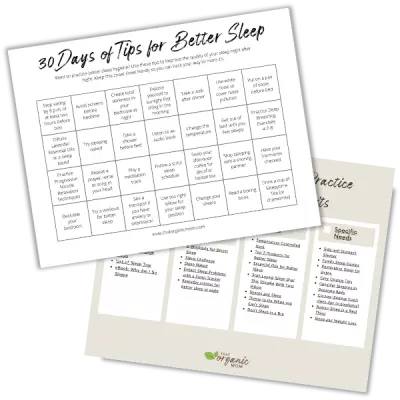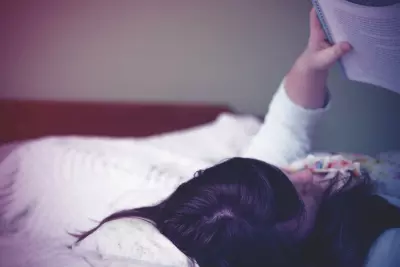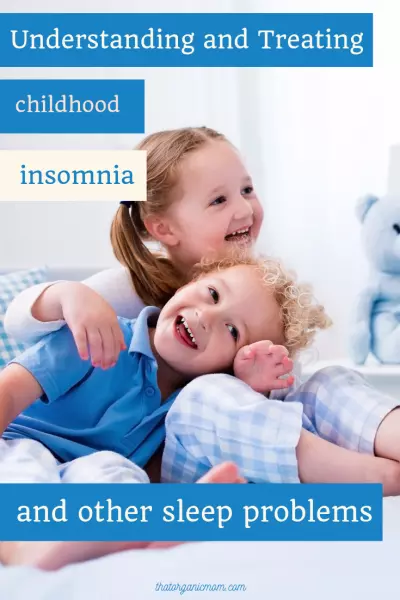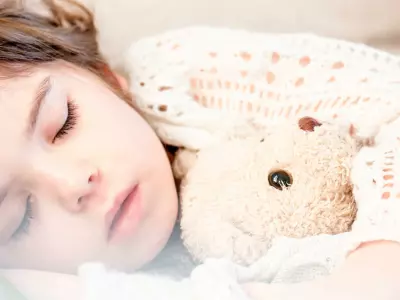Last Updated on June 29, 2022 by Rebecca Huff
Children need quality and quantity sleep
During sleep, the body promotes growth, support mental development, and conserve energy. Parents already know that when kids miss out on sleep, it can lead to irritability, but the problem goes beyond being a grump.
An enormous amount of research has been conducted on sleep in children. The most common sleep disorders in childhood are insomnia and nightmares. Primary care providers typically address sleep issues in infants and toddlers. However, adequate screening for children older than preschool age isn't the norm. Therefore, sleep disorders in elementary age children get overlooked, which results in sleepy students.

Risks involved with missing out on sleep
Kids that miss out on sleep are at a higher risk for behavioral problems such as aggression, moodiness, increased risk of vehicle crashes, and health problems such as obesity. A study at Michigan State University concluded that portion sizes increased after insufficient sleep and that these larger portions put those participants at an increased risk for obesity.
On the flip side, children who sleep more eat and weigh less according to this study. Children who slept more consumed, on average, 134 calories less and had lower fasting morning leptin values.
Babies wake up throughout the night because of a shift in brain waves, as babies transition from one stage of sleep to another, they often wake. After waking, babies may feel hungry and cry out. Other times a baby may want comfort because they have learned to fall back to sleep on their own. Older babies may wake due to teething.
Toddlers and younger children may have trouble falling asleep due to fear and worries. At this age, children may experience difficulty falling asleep when they are afraid of the dark or being alone. When children have nightmares, it can also hinder their ability to fall asleep.
Encouraging your child to talk about or draw a picture of the nightmare can help to get it out of their system. Reading a calm and peaceful book before bed might help your child to fall asleep faster and sleep better. Avoid scary tv shows and movies (even if your child says they are not scared) because it can cause more bad dreams.
Children (and teens) who miss out on sleep regularly may begin to focus on negative events. As parents, we have a heavy responsibility to prioritize sleep for our children.
Teens and Preteens may have a disruption in their sleep patterns when they hit puberty. The internet, TV, video games, and social media also play a role in decreased sleep time among teens.
Stress and worry can also keep adolescents awake. Exams, peer pressure, and other factors can affect stress levels in kids. Parents can help address these worries with children to improve sleep.
Sedentary kids who experience sleep problems may benefit from adding at least 30 minutes of exercise daily. Participating in martial arts, sports, and simple outdoor play can help children get better sleep. People sleep significantly better and feel more alert during the day if they get at least 150 minutes of exercise a week, a new study concludes. Children who have difficulty will benefit from sufficient physical activity.
According to the Journal of Clinical Sleep Medicine, consistently getting sufficient sleep is associated with improved health, such as improvement in the following areas:
- attention
- focus
- behavior
- memory
- physical health
- mental health
- emotional regulation
- quality of life
Nine out of ten teenagers aren't getting enough sleep. During the teen years, sleep loss occurs due to later bedtimes, while wake times remained the same. In one survey, adolescents reported increased daytime sleepiness, depressive mood, and sleep/wake behavior problems, which impacted grades.
Most teens can learn to practice good sleep hygiene habits; however, many still sacrifice precious hours of shut-eye. Here is an article for teens who are willing and ready to implement some healthy sleep habits.
For younger children, here are some tips:
Follow a consistent bedtime and wake time routine. Kids who have later or inconsistent bedtimes often don't eat breakfast and can experience blood sugar imbalances that lead to irritability later in the day.
Caffeine isn't a great idea for kids, but if your child does consume caffeine, try to limit it after lunchtime, assuming lunch happens somewhere around noon, that is.
Children with smartphones and other devices will not benefit from using them at night. Limit screentime in the hours before bedtime. Children who slept near a small screen (compared with never) reported 20.6 fewer minutes of sleep.
In an ideal world bedrooms would not contain screens, however, I know that is unlikely in society today, so at the very least, try to involve them in an activity before bedtime that does not require screentime.
Skip watching television right before bed – This is a hard one for many of us. However, according to experts, watching tv right before bed may have more negative effects than we realize.
Some children may benefit from writing in a journal or making their own to-do list before they go to bed.
Calming stories on audio have been a go-to in our family for many years. We use the library app Overdrive as well as Audible to listen to audio books.
Essential Oils for sleep include lavender, Valerian, Sweet Marjoram, Roman Chamomile, bergamot, and Clary Sage. Our favorite essential Oil blend for sleep is Aura Cacia's Pillow Potion. It is widely available at health food stores, and Amazon.
If you don't have a diffuser there are other ways to reap the benefits of these oils. Try putting a few drops on a wool dryer ball and tossing in the dryer with the sheets. Make a spray to spritz into the air just before bedtime. Alternatively, you can add a drop to a carrier oil and apply it topically.
Always use caution when using essential oil on children as they are potent. Babies have skin that is many times more sensitive than adults, therefore are not recommended on infants. Some essential oils, such as wintergreen, should never be used with children.
Unrecognized anxiety could be causing difficulty falling asleep. Prayers and select verses about God's protection are a powerful way to calm your child and help them sleep more peacefully.
Magnesium may work for some, but because too much can lead to diarrhea, magnesium oil, or lotion is preferable. For those who enjoy do-it-yourself projects, consider making a magnesium body butter.
Download the 30 Days of Tips for Better Sleep

Some other tips include:
- completely dark room
- white noise
- refrain from eating before bedtime, especially grains and sugars as they tend to raise blood sugar levels which in turn can hinder sleep
- eliminating caffeine
- avoiding screens
- using audio books (nothing too exciting)
- warm bath/shower with Epsom salts, magnesium flakes, or lavender
- Bedroom temperatures should not exceed 70 degrees Fahrenheit
- herbs such as Chamomile, Passion Flower, California Poppy
- the supplements GABA, L-Theanine, and Melatonin
Sleep environment
The mattress a child sleeps on can make a difference in how sleep quality. Overheating can cause sleep disturbances. Choosing a mattress with a cool comfort top, can be helpful. “Beaded gel foam is the ultimate in cooling technology, drawing heat away from the body. Thousands of micro-pores allow the movement of air throughout the foam, dissipating heat and promoting cooler, undisturbed sleep.”
Sleep disturbances in individuals with ADHD can result in significant functional impairments that affect mood, attention, behavior, and ultimately, school/work performance and quality of life.
Obstructive sleep apnea can occur in children primarily due to enlarged tonsils and adenoids. While not all children who snore will have apnea, the prevalence among children who snore is higher. Children who sleep in unusual positions may be experiencing symptoms of sleep apnea.
Some children have a learned inability to fall asleep and stay asleep – in this case, consistently practicing good sleep hygiene with consistent sleep and wake time plus light therapy in the early morning and perhaps melatonin at night can be an effective treatment.
Breathing techniques can also help children fall asleep. Here are two methods to teach your child:
Square breathing. Begin by slowly exhaling all of your air out. Then, gently inhale through your nose to a slow count of four. Hold at the top of the breath for a count of four. Then, gently exhale through your mouth for a count of four. At the bottom of the breath, pause and hold for a count of four. Repeat as necessary until you fall asleep.
Alternate nostril breathing. Take the ring finger on your right hand, press down on the left side of your nostrils, and breathe in with your right nostril. Then, take your thumb, close off your right nostril, and exhale from the left nostril. ~ The Bed Boss blog
Guided meditations may help some children fall asleep faster. The Calm app has programs of varying lengths that may help children with anxiety get to sleep.
Another option for helping children would be using a weighted blanket, which has shown to be helpful for those who suffer from anxiety or have trouble getting to sleep. Weighted blankets are available in different weights, so choose according to your child's age. An elementary age child would typically use a 9-12 pound blanket, while teens may prefer 12-20 pounds.
According to research, we sleep deeper and experience increased recovery at cooler body temperature. Our core body temperature should naturally drop every night, but for lots of people and lots of reasons it doesn't.
Temperature is one of the most critical factors in sleeping well; the quicker the body can shed heat, the quicker it can get to sleep. The faster it gets to sleep, the quicker the sleep cycle kicks in. The sooner the sleep cycle kicks in, the sooner your body can begin the natural process of repairing cellular structures, making sense of the brain's memory of events, and preparing the body to power through the next day.
Finally, the child may benefit from seeing a sleep specialist when behavioral changes do not result in improved sleep.
Don't forget TOM Tribe members can take 20% off at The Bed Boss using coupon code TOM20

The Content provided on ThatOrganicMom is not intended to be a substitute for professional medical advice, diagnosis, or treatment. Always seek the advice of your physician or other qualified health provider with any questions you may have regarding a medical condition.

Sources:
Changes in Bedtime Schedules and Behavioral Difficulties in 7-Year-Old Children
https://pediatrics.aappublications.org/content/132/5/e1184
Sleep Duration, Restfulness, and Screens in the Sleep Environment
https://pediatrics.aappublications.org/content/135/2/e367


 Amazing Anti-Aging Benefits of Coffee
Amazing Anti-Aging Benefits of Coffee
Thank you for this. I need to implement all of this.